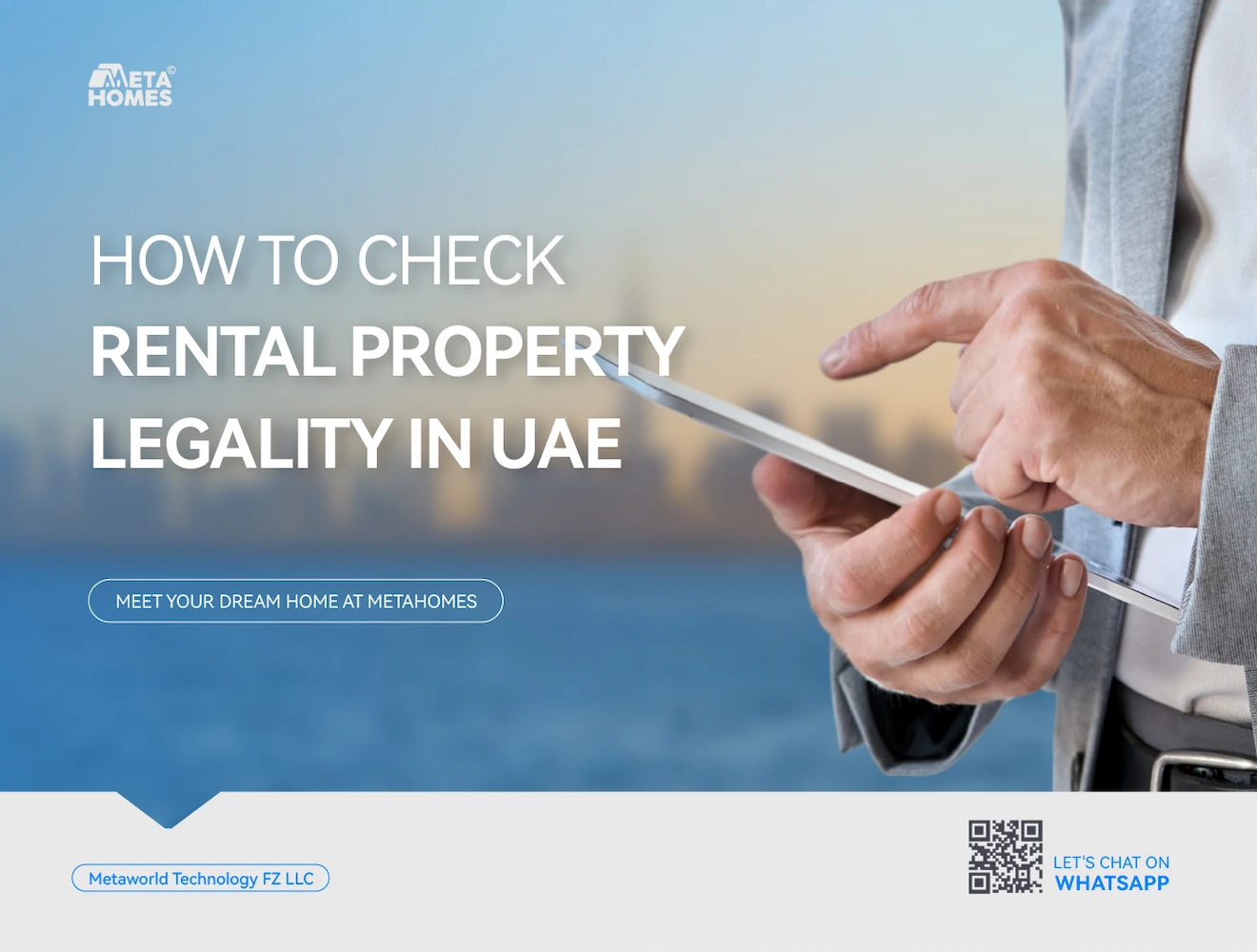
In UAE, it’s a common thing for both locals and newcomers to rent a property in Dubai or any other emirate.
You’ll find a lot of choices in the market, like studio apartments, 1-bedroom apartments, 2-bedroom flats, and even townhouses for rent.
A whole lot of the properties come as fully furnished apartments, making it easy to move in.
But not every rental property is exactly what it looks like. Some listings might seem appealing, but they could actually be illegal, unregistered, or managed by individuals who aren’t the true owners.
If renters don’t look into whether the property is legal, they would probably end up wasting money, having trouble with utilities, or even dealing with surprise evictions.
But the good news is that checking the legality of rental properties in the UAE is not complicated.
In fact, it is one of the easiest things you can do, but it does need a careful eye. Just a few straightforward steps, like checking ownership documents, ensuring the contract is registered, and working only with licensed agents, can help keep tenants safe from issues down the line.
How to Verify the Legality of Rental Properties in UAE
It’s pretty straightforward to check if a rental property is legal in the UAE, but you do need to follow a few specific steps in the right order. Following these steps will help you make sure the property is real.
First, request the Title Deed
All rental properties that are legally available need to have a title deed from the Land Department of the emirate.
Ask the landlord or agent to show you this document. The name on the title deed needs to be the same as what’s on the landlord’s Emirates ID or passport.
If you’re working with an agent, just double-check that they have the owner’s written permission to rent out the property.
Next, check the agent’s license
If a real estate agent is handling the process, ensure that they are licensed. In Dubai for example, agents need to register with RERA, which is the Real Estate Regulatory Agency.
You can either ask for their RERA card or check them out on the Dubai REST app. Working only with licensed agents can drastically reduce the risk of getting scammed.
Check the Property with Official Platforms
Each emirate has an official system to verify property details. The Dubai REST app, for example, shows you who owns a property in Dubai.
Once you have the title deed or property number, you can confirm ownership. This is one of the easiest ways to be sure the property is genuine.
Confirm Ejari or Tenancy Registration
In Dubai, you need to register every rental contract with Ejari. If you don’t have this, the tenancy agreement won’t be legally valid.
In Abu Dhabi, they refer to it as Tawtheeq, but Sharjah and other emirates have their own ways of doing things. It’s really important to get the contract registered.
Without that, you won’t be able to set up utilities, sponsor family visas, or take any legal steps if there are disputes.
Review the Rental Contract Carefully
Make sure to read the contract carefully, line by line, before you sign it. Also, keep an eye on the following:
- The rent amount and the payment schedule which is typically done with post-dated cheques.
- The length of the lease and how the renewal process works.
- Who’s responsible for maintenance and repair costs?
- Information about the furniture and appliances, whether it’s an unfurnished apartment or a fully furnished apartment.
Everything needs to be written in a clear way. It’s best not to depend on just spoken promises.
Note that there are penalties if you decide to end the contract early.
Check out the property in person
Make sure to check out the property in person before making any further decisions, like payments.
When you’re looking to rent a studio apartment, make sure the space matches what it claims to be.
If you’re searching for larger rentals like 2-bedroom flats or apartments, be sure to check out all the rooms, bathrooms and amenities available.
If the place is furnished, make sure to snap some pictures of the furniture and appliances.
Make Payments Safely
Payments should never be made in cash without receipts. The standard practice in the UAE is payment by cheque in the landlord’s name.
Bank transfers are also safe. Always collect receipts for deposits and rent. Steer clear of anyone who tries to rush you into paying in cash.
Get the Ejari or Registration Certificate
Once you sign and register the contract, you should receive a certificate, like Ejari in Dubai or Tawtheeq in Abu Dhabi.
This document shows that the rental property is real and that the authorities are aware of your tenancy.
NB: Make sure to keep copies of the title deed, the lease, the Ejari or registration certificate, the payment receipts, and the agent’s license, if you have one. These documents are really important in case any disagreements come up.
If you follow these steps, you can safeguard yourself from scams and ensure that your rental property, be it a townhouse, a one-bedroom apartment, or a fully furnished apartment, is completely legal and secure.
Red Flags to Watch Out for Rental Property in UAE
Even if the property seems great and the offer is appealing, there are some red flags that might suggest the rental isn’t legal.
Noticing these warning signs can help tenants avoid losing money or getting into arguments. Here are the things to watch out for:
1. Unusually Low Rent
If you come, let’s say across a 3-bedroom flat for rent that costs the same as a studio, you might want to be a bit cautious.
Scammers frequently promote luxury homes or fully furnished apartments at prices that seem too good to be true, hoping to lure in quick payments.
2. No Title Deed
A trustworthy landlord should always have the title deed ready to show you. If the landlord or agent is dodging showing you this document or says it’s not needed, there might be something off with the property’s legality.
3. Unlicensed Agents
Working with someone who can’t provide a valid RERA card or proof of registration with the local authority in Dubai, or any other emirate can be pretty risky. You can easily check if agents are licensed using official apps and websites.
4. Agents Not Willing to Register the Contract
You need to register a rental property in Ejari if you’re in Dubai, Tawtheeq for Abu Dhabi, or the local tenancy system for whichever emirate you’re in.
If the landlord or agent isn’t willing to do this, that’s definitely a red flag. The contract won’t hold any legal weight if it’s not registered.
5. Urgency to Make Payments
Scammers usually try to rush you by claiming that other tenants are interested and pushing for quick payment.
A trustworthy landlord or agent will give you some time to go over the documents and the contract.
6. Payments in Cash Only
Paying cash without receipts is one of the biggest risks. A proper rental process in the UAE usually involves cheques in the landlord’s name or official bank transfers.
7. Inconsistent Information
A deceptive listing is when the information in the ad doesn’t line up with the actual property being advertised.
If you find a two-bedroom flat for rent that’s just a one-bedroom with a partition wall, that’s a clear sign the ad isn’t truthful.
8. Viewing Not Allowed
If the landlord or agent doesn’t let you check out the property before you sign or asks for payment up front, it’s likely a scam. It’s good to check out the property in person before you agree to anything.
In conclusion, the rental market in the UAE provides a diverse range of options, including budget-friendly studio apartments, expansive houses, and luxurious fully furnished apartments.
Given the multitude of choices available, it is understandable to prioritize factors such as location, pricing, and amenities. However, the primary consideration is legality.
Confirming the details of a rental property is straightforward. Tenants can safeguard themselves from scams and disputes by verifying the title deed, ensuring the agent holds a valid license, registering the tenancy contract (Ejari, Tawtheeq, or equivalent), and making secure payments.
Whether you are relocating to a one-bedroom apartment, a two-bedroom apartment, a three-bedroom apartment, or a townhouse, it is essential to adhere to the same guidelines: ensure that you do not overlook the necessary legal checks.
What documents does a landlord need to provide when renting out a property in UAE?
The landlord needs to provide:
- A copy of the title deed – A copy of their Emirates ID or passport.
- A tenancy contract that’s all set for registration (Ejari in Dubai, Tawtheeq in Abu Dhabi).
Is Ejari required for every rental property in Dubai?
Absolutely. In Dubai, it’s important to register every tenancy agreement with Ejari. It doesn’t matter the type of property. Whether you are renting a one-bedroom apartment or a five-bedroom apartment in UAE, Ejari is a must
Can I pay rent in cash?
It is strongly advised not to. The standard practice is payment by cheque in the landlord’s name or through bank transfer. Always keep receipts.
Do rental scams happen frequently in the UAE?
They are not extremely common, but they do happen. Scammers usually advertise properties at very low prices or ask for quick cash payments. Following the legal steps reduces your risk.
What can I do if I think a rental property might be illegal?
Please hold off on making any payments. Make sure to report the situation to your local Land Department or Municipality and only work with verified landlords or licensed agents.
What could happen if the property isn’t registered?
If the property isn’t registered, you might run into issues opening utility accounts, renewing your visa, or settling disputes legally. If the property ends up being illegal, you might also lose your deposit or get an unexpected eviction.



Comments (2)
Liam_Psays:
October 28, 2025 at 11:02 amGreat insight. Well done.
JaneLearnssays:
October 17, 2025 at 7:09 amSaved! I know I’ll be coming back to this.